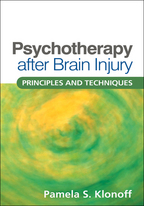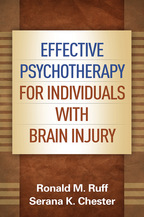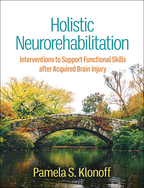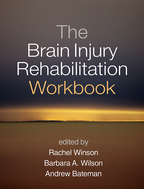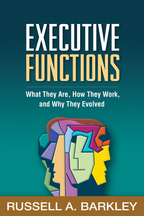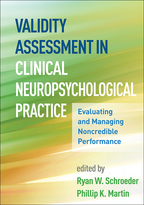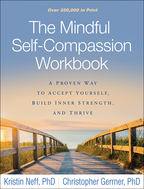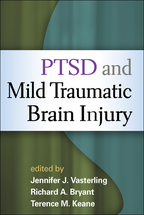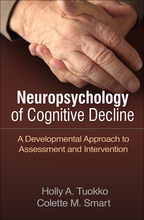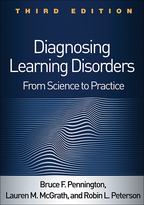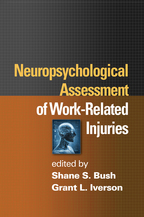Psychotherapy after Brain Injury
Principles and Techniques
Pamela S. Klonoff
Hardcovere-bookprint + e-book
Hardcover
orderJune 9, 2010
ISBN 9781606238615
Price: $64.00288 Pages
Size: 7" x 10"
“Brain injury psychotherapy has evolved into a robust subspecialty with a range of evidence-based treatment modalities, ranging from cognitive rehabilitation to behavioral self-management, to insight-oriented psychotherapy. This is presented all in one package by brain injury expert Pamela Klonoff. While this book is designed for clinicians working in structured program settings, most of its lessons can be productively applied by clinicians working in outpatient, office-based settings....A clinical masterwork by a seasoned doctor that takes a hard-headedly realistic, yet exquisitely compassionate approach to the treatment of patients with traumatic brain injury. If you are a neuropsychologist or psychotherapist who evaluates or treats brain-injured patients, this is the standard by which you should be practicing, and this book is required reading.”

—International Journal of Emergency Mental Health
“A must read for psychology interns and postdoctoral residents who plan to provide psychotherapeutic and behavioral services to patients and families who are wrestling with the numerous life challenges following acquired brain injury....The chapters are well written and consistently structured which makes for easy reading....I found the content refreshing in that it helped me to think about my own practice and other creative ways in which to address complex situations. The book is filled with helpful tables, handouts, homework exercises, and therapeutic techniques that are well written and thoughtfully designed. I think that most seasoned practitioners in rehabilitation come to appreciate the importance of flexibility in day-to-day practice....Klonoff's book certainly helped me to add to, update, and polish up my own personal therapeutic tool kit....One of the book's major strengths is Klonoff's eloquent retelling of case studies that complement chapter themes. In my experience, this teaching method can be very effective with trainees who are learning to provide psychotherapeutic services....A nice addition to the literature on treatment following acquired brain injury. Being that it stresses the process and provision of psychotherapy, it is an excellent complement to other resources that outline cognitive rehabilitation and behavioral management techniques in more depth. In my opinion, books like this are a must read for psychology interns and postdoctoral residents in neuropsychology and rehabilitation psychology. I plan to require my residents to read sections of the book with the other required reading in brain injury rehabilitation....I would strongly recommend making room for it on your bookshelf.”

—Journal of the International Neuropsychological Society
“A patient may do well to hope that the clinician they are working with has read Pamela Klonoff's new book, Psychotherapy after : Principles and Techniques. This text is an invaluable resource for clinicians working with patients who have sustained brain injuries. It is a very thorough guide....Klonoff provides a conceptual framework that allows the reader to envision the recovery process and the skills needed to effectively work with such patients. The book is a useful tool for clinicians of all levels, from graduate students to those well seasoned in their practices. For those new to psychotherapy, Klonoff's text reads like a step-by-step 'How To' manual. For those more seasoned it provides a wonderful synthesis of traditional psychotherapy techniques with specifics of working with brain injured patients. In addition, the text is filled with detailed case studies which are adeptly used to illustrate the techniques offered up in the previous pages. Klonoff also provides the reader with a number of reproducible handouts as well as numerous bibliotherapy and mediatherapy references to psychotherapists no matter what the population....A must read for any psychologist working with patients who have sustained a ....Klonoff masterfully demonstrates psychotherapeutic techniques with this population, bridging the old and new by translating methods used in a therapeutic milieu setting into tools which can be used by psychotherapists working alone in the field. Her skill at illustrating how theory becomes practice provides guidelines for clinicians who are interested in working with this population. Klonoff's optimism and enthusiasm is contagious, leaving the reader feeling eager to begin practicing what they have learned.”

—Brain Injury
“This publication addresses a core fundamental intervention after brain injury, that of psychotherapy, from a holistic perspective. The author provides a very practical analysis of the utility and effectiveness of psychotherapy in this situation. The book was easy to read, taking the reader on a journey through the process of adjustment after brain injury whilst using a clear and structured format. The inclusion of a variety of different case studies really added 'meat to the bones' enabling the reader to clearly grasp the meaning of different approaches in clinical practice. The book is excellent for anyone who wants to gain a greater understanding of working psychotherapeutically with people who have a range of acquired brain injuries. It provides concise perspectives on assessment and intervention over a broad range of mental health and psychological adjustment issues experiences by those with brain injury and their families and will be of practical use for individual professionals and teams of interdisciplinary clinicians. The author's experience and expertise in the area is highly evident, with each chapter being both comprehensive and rich in knowledge on the given topics....It is a very useful guide for psychotherapeutic practitioners who want to understand and work psychotherapeutically with patients in meaningful ways, and these case studies provide key ecologically valid information on applying these approaches.”

—Neuropsychological Rehabilitation
“Dr. Klonoff's model for interventions, her case studies, and her detailed explanations of interventions are well written and thought out....What Dr. Klonoff essentially lays out in this book is an in-depth and evolved version of the comprehensive model of neurorehabilitation that began to flourish in the late 1980s and 1990s, and which became the ideal for such treatment in that time frame under the expert guidance of such famed clinicians as Ben-Yishay, Cicerone, Kay, Mateer, and Sohlberg, and one of the author's mentors, George Prigatano....A thorough, knowledgeable, and informative blueprint for integration of Neuropsychotherapy in the cognitive rehabilitation setting. It is a valuable resource for the clinical neuropsychologist, psychologist, or other clinicians providing treatment with the brain-injured population.”

—Archives of Clinical Neuropsychology
“Contains many helpful hints and practical suggestions regarding planning psychotherapy sessions and other general psychotherapeutic treatment considerations....Klonoff includes a number of case studies that are helpful in terms of understanding techniques, describes important issues with respect to communication, and also discusses treatment termination and therapist self-care. She makes helpful suggestions, introduces useful techniques, and provides checklists that will help clinicians conduct psychotherapy with brain-injured individuals. Klonoff describes relevant psychotherapy research literature from the humanistic–existential psychotherapy approach. She also includes a number of helpful suggestions about getting paid for doing psychotherapy with brain-injured patients....Clinical neuropsychologists, counselors, social workers, and others who may include brain-injured patients in their practices would certainly profit from reading this book. Klonoff is an excellent clinician and expert clinical neuropsychologist. She has done a very commendable job in producing a practical book that can help clinicians conduct psychotherapy with brain-injured patients....Psychotherapy After Brain Injury is a valuable contribution to the psychotherapy literature and will very likely be extremely helpful in facilitation the provision of higher quality psychotherapy services to brain-injured individuals.”

—PsycCRITIQUES
“Klonoff is a talented therapist who combines a wealth of experience and expertise with a deep personal commitment to the process of assisting individuals and families in the challenging process of adjustment following brain injury. This extraordinary volume guides the reader through assessment, diagnosis, and treatment, illustrating the course of therapy with many practical examples. It is essential reading for professionals working in brain injury rehabilitation or with clients who have experienced a brain injury, and an invaluable resource for students and trainees in clinical psychology, clinical neuropsychology, rehabilitation medicine, neuropsychiatry, and social work.”

—Linda Clare, PhD, Professor of Clinical Psychology and Neuropsychology, Bangor University, United Kingdom
“Klonoff provides a window into the unique world of brain injury, where psychology and biology intertwine. What is remarkable about this book is its level of detail. It delineates step by step the goals, tasks, and challenges of each stage of recovery, and features forms, checklists, and lists of adjunctive resources. Excellent case material illustrating both successful and unsuccessful treatment brings the work alive. A welcome resource for treating clients who have experienced any type of brain injury.”

—Robert Taibbi, LCSW, private practice, Charlottesville, Virginia
“An impressive accomplishment. The author is a sure-footed, experienced clinician who shows how to guide clients in their arduous climb toward optimal rehabilitation outcomes. She addresses the client's need to regain functional competence and a feeling of 'belonging,' reconstitute a sense of self, accept limitations posed by the brain injury, and find meaning in postrehabilitation attainments. Many suggestions for facilitating essential compensatory processes are included. This book should become part of the reference library of both novice and seasoned practitioners in the field of neuropsychological rehabilitation.”

—Yehuda Ben-Yishay, PhD, Director, Brain Injury Day Treatment Program, Rusk Institute of Rehabilitation Medicine, New York University
—International Journal of Emergency Mental Health
“A must read for psychology interns and postdoctoral residents who plan to provide psychotherapeutic and behavioral services to patients and families who are wrestling with the numerous life challenges following acquired brain injury....The chapters are well written and consistently structured which makes for easy reading....I found the content refreshing in that it helped me to think about my own practice and other creative ways in which to address complex situations. The book is filled with helpful tables, handouts, homework exercises, and therapeutic techniques that are well written and thoughtfully designed. I think that most seasoned practitioners in rehabilitation come to appreciate the importance of flexibility in day-to-day practice....Klonoff's book certainly helped me to add to, update, and polish up my own personal therapeutic tool kit....One of the book's major strengths is Klonoff's eloquent retelling of case studies that complement chapter themes. In my experience, this teaching method can be very effective with trainees who are learning to provide psychotherapeutic services....A nice addition to the literature on treatment following acquired brain injury. Being that it stresses the process and provision of psychotherapy, it is an excellent complement to other resources that outline cognitive rehabilitation and behavioral management techniques in more depth. In my opinion, books like this are a must read for psychology interns and postdoctoral residents in neuropsychology and rehabilitation psychology. I plan to require my residents to read sections of the book with the other required reading in brain injury rehabilitation....I would strongly recommend making room for it on your bookshelf.”
—Journal of the International Neuropsychological Society
“A patient may do well to hope that the clinician they are working with has read Pamela Klonoff's new book, Psychotherapy after : Principles and Techniques. This text is an invaluable resource for clinicians working with patients who have sustained brain injuries. It is a very thorough guide....Klonoff provides a conceptual framework that allows the reader to envision the recovery process and the skills needed to effectively work with such patients. The book is a useful tool for clinicians of all levels, from graduate students to those well seasoned in their practices. For those new to psychotherapy, Klonoff's text reads like a step-by-step 'How To' manual. For those more seasoned it provides a wonderful synthesis of traditional psychotherapy techniques with specifics of working with brain injured patients. In addition, the text is filled with detailed case studies which are adeptly used to illustrate the techniques offered up in the previous pages. Klonoff also provides the reader with a number of reproducible handouts as well as numerous bibliotherapy and mediatherapy references to psychotherapists no matter what the population....A must read for any psychologist working with patients who have sustained a ....Klonoff masterfully demonstrates psychotherapeutic techniques with this population, bridging the old and new by translating methods used in a therapeutic milieu setting into tools which can be used by psychotherapists working alone in the field. Her skill at illustrating how theory becomes practice provides guidelines for clinicians who are interested in working with this population. Klonoff's optimism and enthusiasm is contagious, leaving the reader feeling eager to begin practicing what they have learned.”
—Brain Injury
“This publication addresses a core fundamental intervention after brain injury, that of psychotherapy, from a holistic perspective. The author provides a very practical analysis of the utility and effectiveness of psychotherapy in this situation. The book was easy to read, taking the reader on a journey through the process of adjustment after brain injury whilst using a clear and structured format. The inclusion of a variety of different case studies really added 'meat to the bones' enabling the reader to clearly grasp the meaning of different approaches in clinical practice. The book is excellent for anyone who wants to gain a greater understanding of working psychotherapeutically with people who have a range of acquired brain injuries. It provides concise perspectives on assessment and intervention over a broad range of mental health and psychological adjustment issues experiences by those with brain injury and their families and will be of practical use for individual professionals and teams of interdisciplinary clinicians. The author's experience and expertise in the area is highly evident, with each chapter being both comprehensive and rich in knowledge on the given topics....It is a very useful guide for psychotherapeutic practitioners who want to understand and work psychotherapeutically with patients in meaningful ways, and these case studies provide key ecologically valid information on applying these approaches.”
—Neuropsychological Rehabilitation
“Dr. Klonoff's model for interventions, her case studies, and her detailed explanations of interventions are well written and thought out....What Dr. Klonoff essentially lays out in this book is an in-depth and evolved version of the comprehensive model of neurorehabilitation that began to flourish in the late 1980s and 1990s, and which became the ideal for such treatment in that time frame under the expert guidance of such famed clinicians as Ben-Yishay, Cicerone, Kay, Mateer, and Sohlberg, and one of the author's mentors, George Prigatano....A thorough, knowledgeable, and informative blueprint for integration of Neuropsychotherapy in the cognitive rehabilitation setting. It is a valuable resource for the clinical neuropsychologist, psychologist, or other clinicians providing treatment with the brain-injured population.”
—Archives of Clinical Neuropsychology
“Contains many helpful hints and practical suggestions regarding planning psychotherapy sessions and other general psychotherapeutic treatment considerations....Klonoff includes a number of case studies that are helpful in terms of understanding techniques, describes important issues with respect to communication, and also discusses treatment termination and therapist self-care. She makes helpful suggestions, introduces useful techniques, and provides checklists that will help clinicians conduct psychotherapy with brain-injured individuals. Klonoff describes relevant psychotherapy research literature from the humanistic–existential psychotherapy approach. She also includes a number of helpful suggestions about getting paid for doing psychotherapy with brain-injured patients....Clinical neuropsychologists, counselors, social workers, and others who may include brain-injured patients in their practices would certainly profit from reading this book. Klonoff is an excellent clinician and expert clinical neuropsychologist. She has done a very commendable job in producing a practical book that can help clinicians conduct psychotherapy with brain-injured patients....Psychotherapy After Brain Injury is a valuable contribution to the psychotherapy literature and will very likely be extremely helpful in facilitation the provision of higher quality psychotherapy services to brain-injured individuals.”
—PsycCRITIQUES
“Klonoff is a talented therapist who combines a wealth of experience and expertise with a deep personal commitment to the process of assisting individuals and families in the challenging process of adjustment following brain injury. This extraordinary volume guides the reader through assessment, diagnosis, and treatment, illustrating the course of therapy with many practical examples. It is essential reading for professionals working in brain injury rehabilitation or with clients who have experienced a brain injury, and an invaluable resource for students and trainees in clinical psychology, clinical neuropsychology, rehabilitation medicine, neuropsychiatry, and social work.”
—Linda Clare, PhD, Professor of Clinical Psychology and Neuropsychology, Bangor University, United Kingdom
“Klonoff provides a window into the unique world of brain injury, where psychology and biology intertwine. What is remarkable about this book is its level of detail. It delineates step by step the goals, tasks, and challenges of each stage of recovery, and features forms, checklists, and lists of adjunctive resources. Excellent case material illustrating both successful and unsuccessful treatment brings the work alive. A welcome resource for treating clients who have experienced any type of brain injury.”
—Robert Taibbi, LCSW, private practice, Charlottesville, Virginia
“An impressive accomplishment. The author is a sure-footed, experienced clinician who shows how to guide clients in their arduous climb toward optimal rehabilitation outcomes. She addresses the client's need to regain functional competence and a feeling of 'belonging,' reconstitute a sense of self, accept limitations posed by the brain injury, and find meaning in postrehabilitation attainments. Many suggestions for facilitating essential compensatory processes are included. This book should become part of the reference library of both novice and seasoned practitioners in the field of neuropsychological rehabilitation.”
—Yehuda Ben-Yishay, PhD, Director, Brain Injury Day Treatment Program, Rusk Institute of Rehabilitation Medicine, New York University

